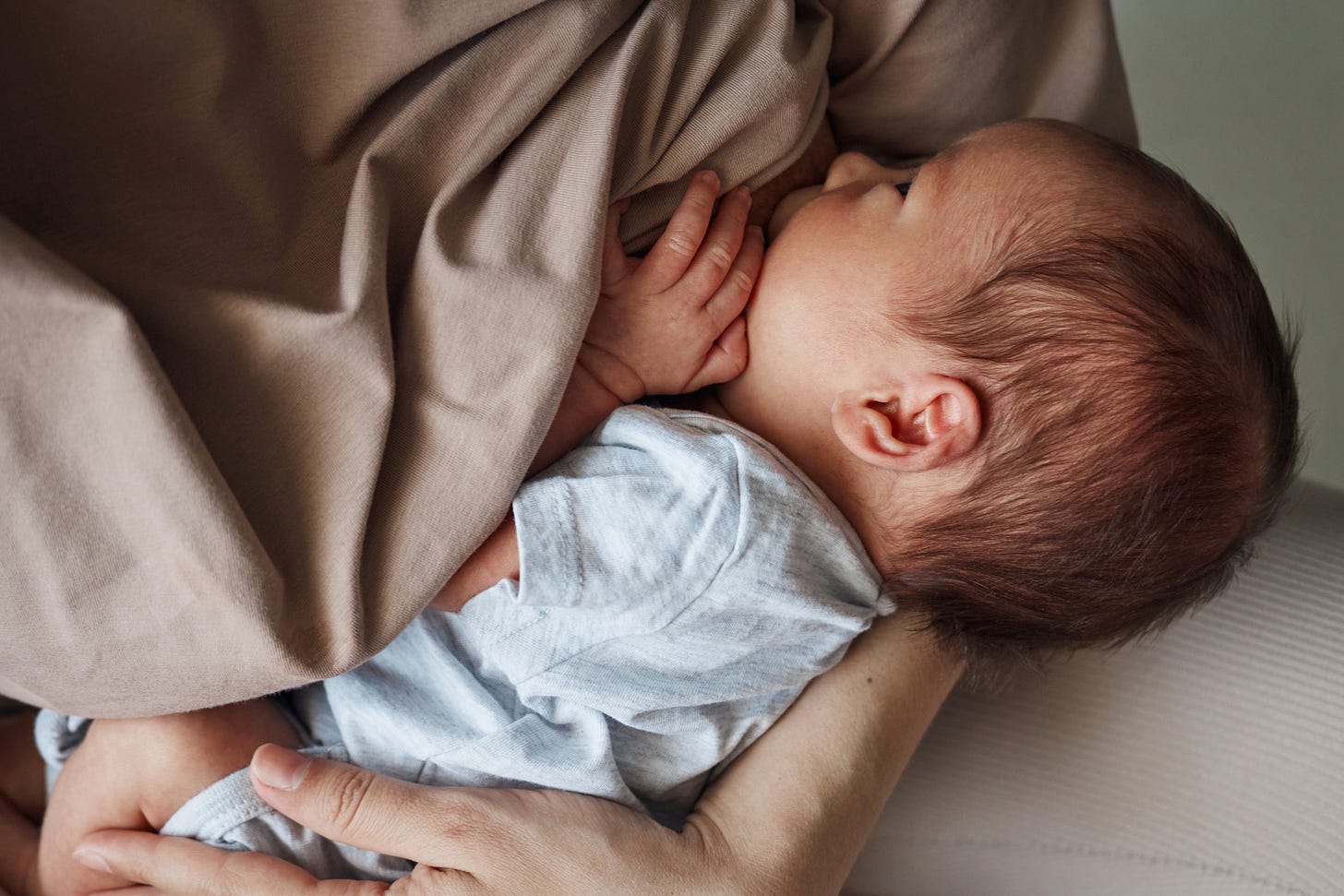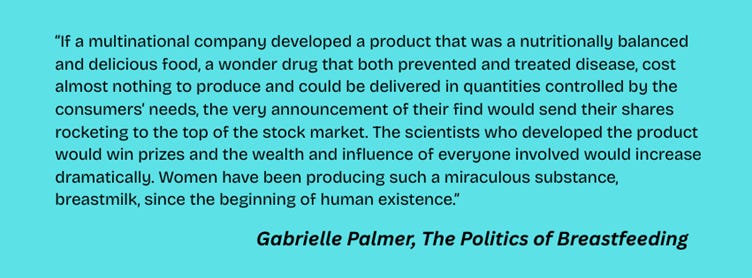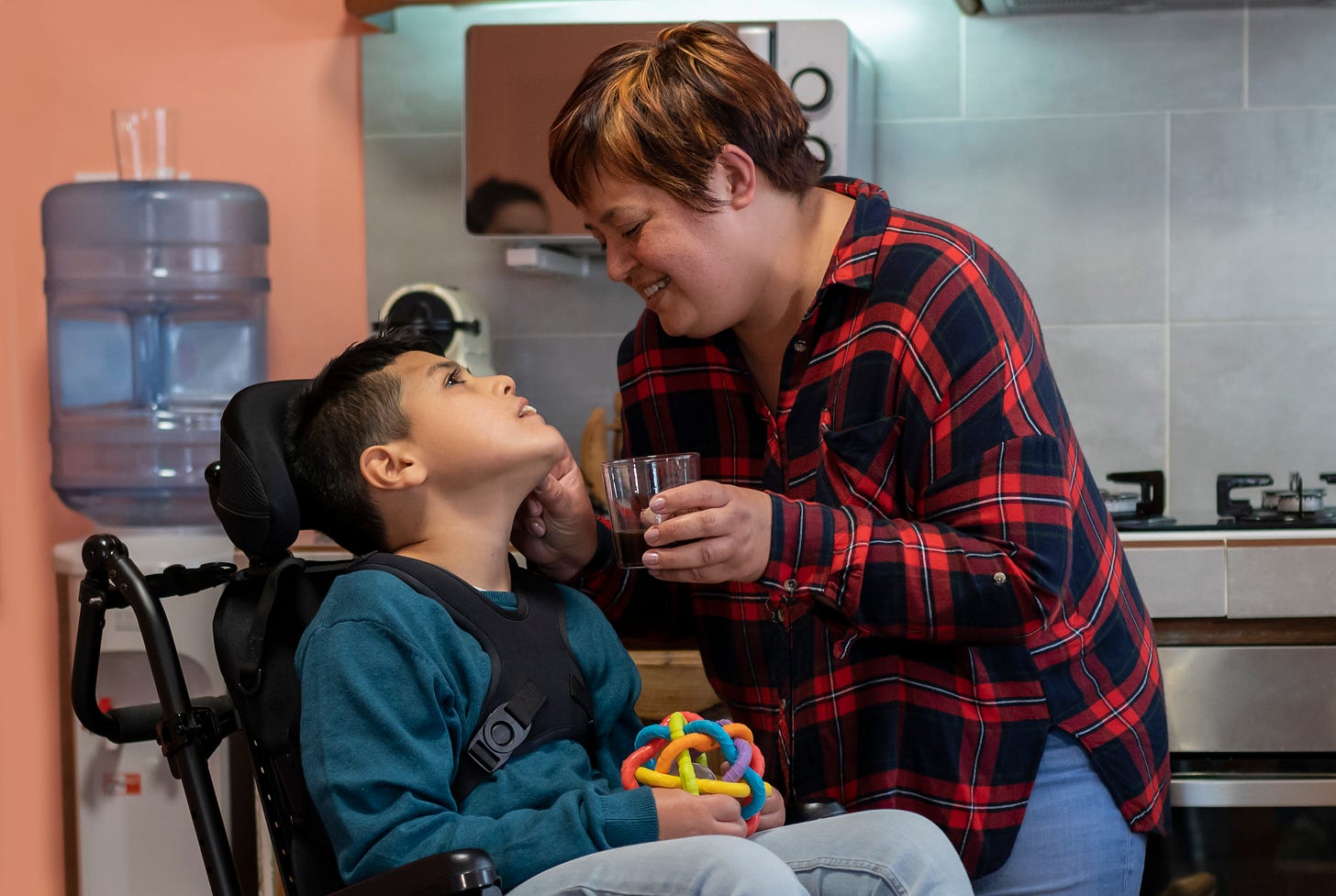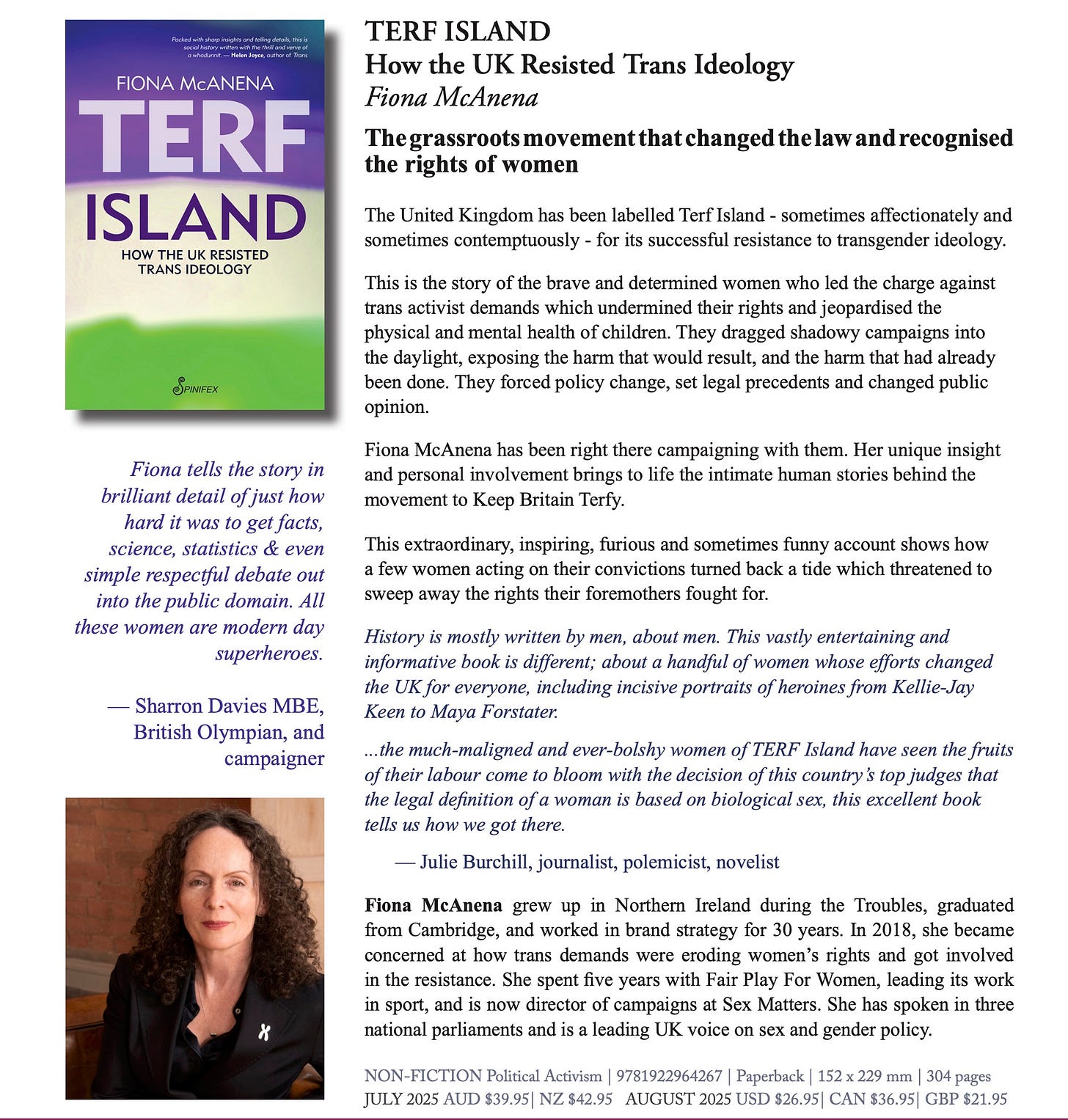Pic via iStock
The theme of this edition is caring - the work that falls mainly to women. Most of us have experience of caring responsibilities, whether it’s bringing up baby or caring for vulnerable family members. Even our Woman of the Week Babs Babington, whose expertise helped save countless of lives during World War 2, spent some of her time caring for her mother. As she said at the time, it was, “the duty that falls to the eldest unmarried daughter”.
Today sees the start of World Breastfeeding Week, which has been celebrated in the first week of August for more than 30 years. Elaine Smith, one of the first intake of women to the Scottish Parliament in 1999, made history when her bill on breastfeeding in public received Royal Assent and became law in 2005. It was the first private members’ bill to be passed by the Scottish Parliament in its new permanent home at Holyrood. She recalls the campaign for The Frontline readers.
Our second woman on the frontline is Linda Craik, who gave up her successful career to care for her brother and her father. She speaks for the 5.8 million unpaid carers round the UK.
Every parliament around Britain is currently on holiday, but the work of policy-making continues. Policy and Power highlights the Medicines and Healthcare Products Regulatory Agency’s consultation on new guidelines for the appropriate inclusion of pregnant and breast-feeding women in clinical trials of medicines. There’s also a helpful reminder of the deadline for the Stage 1 consultation for Pam Gosal MSP’s Prevention of Domestic Abuse (Scotland) Bill.
The button at the end of this issue takes you to our subscriber chat. As ever, you can also find us in real time on X/Twitter, at @DalgetySusan and @LucyHunterB, and our shared account @EthelWrites.
We are delighted that we can now plan for our fortnightly 21st century feminist publication to remain fully accessible. But we depend on some of our readers becoming paid subscribers so that we can pay our contributors, as well as keep the newsletter free so ALL women can access it. If you can afford a paid subscription, please consider getting one. Thank you.
How the advent of the Scottish Parliament was used to push breastfeeding up the political agenda and make breastfeeding in public places a woman’s legal right
By Elaine Smith (MSP from 1999 to 2021)
Pic via iStock
In the early years of the Scottish Parliament, established in May 1999, it was difficult for backbench MSPs to have private members bills passed into law. The establishment wasn’t keen on laws that it didn’t own and control. Government ministers were not easily convinced of the merit of laws not included in their annual Programme for Government. And the civil service were resistant to any proposal that hadn’t been thoroughly vetted by them.
In addition, backbench MSPs were not as generously resourced as they are now. We had limited staff to carry out research and casework and no access to legal advice. There was a parliamentary unit whose role was to advise backbenchers on how to bring forward legislation, but it was in its infancy and not particularly well developed. However, I really wanted to use my position to make a difference for women and so decided that I should consider introducing a bill.
When I was interviewed by Labour for their list of parliamentary candidates, I had to outline a private members’ bill that I might introduce. My choice was a right to respite for carers – who are, of course, mainly women. However, early in the parliament, the Labour-led Scottish government gave a commitment to introduce such rights.
Tackling hostile attitudes
One of my first speaking events after I became an MSP was the Lanarkshire Breastfeeding Conference. As I researched my speech, I was disturbed to discover that Lanarkshire had the lowest rates of breastfeeding in the country, and Scotland had the lowest in Europe. At the conference I heard many stories of negative experiences of breastfeeding in public, which resonated with my own experience. I decided that tackling hostile attitudes to breastfeeding in public and supporting breastfeeding mothers could be one way to help increase rates and support women.
I lodged a parliamentary motion, which was chosen for debate - the first time breastfeeding had been debated in the Scottish Parliament. During my speech, I mentioned an incident involving a mum and baby who were thrown off a Lothian bus for breastfeeding. In response, the then minister Malcolm Chisholm, said:
“There have been many instances of hostile reaction to mothers who breastfeed in a public setting. Elaine Smith referred to the incident in Edinburgh in which, we were all horrified to learn, a mother was told to get off a bus because she was breastfeeding. Ministers wrote to Lothian Regional Transport, as it then was, but under current laws we do not have powers to enforce anything on a bus company in that regard”.
This became my challenge: to change the law to help mothers and babies with new powers to ensure that appalling situations like this could be legally challenged.
The challenges of a private member’s bill
Of course, it’s all very well having an idea for a private members’ bill, but the reality of making it happen is something else. If it is genuinely your own bill and not a government ‘plant’, then you are entirely on your own. There is no army of civil servants and lawyers to assist you, and at the outset the parliament’s bills unit was less than helpful. It judged my proposal to be outwith devolved competency, so I had to find my own legal help to write the legislation. This was provided by Mike Dailly of Govan Law Centre, with assistance from my own staff.
I floated the idea to parliament without realising that Labour group standing orders meant that I should have elicited the support of my MSP colleagues first. I later became an expert on the rule book, but that’s another story! It turned out to be irrelevant, as the proposal I lodged was deemed incompetent by the then Presiding Officer David Steel, on the grounds that it was a matter of ‘equalities’, and the Equality Act is of course reserved to the UK Parliament.
Undeterred, I waited until after I was re-elected in May 2003, and started work on a new bill with the help of Jenny Warren, the national breastfeeding adviser at the time, and the advisory group I had previously set-up which included representatives from trade unions, health and voluntary sectors, police and business.
Mike Dailly and I creatively rewrote the bill using Scots criminal law so that the focus was on children’s health and their right to feed, rather than my intitial preference for a women’s rights angle. But as another Labour politician once said, what matters is what works, and the new Presiding Officer, George Reid, approved the bill as competent.
That is when the hard work started. I had to secure political support, give expert evidence to committee and steer the bill through its chamber process. Luckily, I was helped immensely by former health minister Susan Deacon who was very supportive, not only with her expertise and knowledge, but with her encouragement.
The majority of parties were persuaded to support the legislation, except for the Conservatives. On 18 November 2004, the bill passed its third stage, becoming the first member’s bill to be passed in the new parliament building at Holyrood to the delight of the large group of mums and babies in the gallery. It received Royal Assent on 18 January 2005 becoming an Act of Parliament, and so the law of the land.
Gabrielle Palmer’s observations remind us that breast is indeed best - a ‘designer’ food with amazing health benefits for both mother and child. In the 20 years since my bill became law, there is still much to do to promote breastfeeding, here and across the world. World Breastfeeding Week, which starts today (1 August), recognises the importance of breastfeeding for both mother and child. And I continue to do what I can to raise awareness, recently helping three Labour women comrades to lodge breastfeeding motions at every level of government: Cllr Geraldine Woods, Carol Mochan MSP and Joani Reid MP. And I hope the Scottish Government will invest the resources required to make their recently published breastfeeding strategy a reality. Women need more than warm words to support them during the vital months and years of breastfeeding.
Elaine Smith was a Labour MSP from 1999- 2021 & Deputy Presiding Officer from 2011- 2016. She served for 12 years on the Equal Opportunities Committee as the Reporter on women. She is currently the Women's Officer in her CLP. Her earlier career included teaching, working in Local Government and in the voluntary sector, including Monklands Women’s Aid.
World Breastfeeding Week began in 1991 and is celebrated every year in the first week of August, led by the WHO, UNICEF, Ministries of Health and civil society partners around the globe. It recognises breastfeeding as a powerful foundation for lifelong health, development, and equity. In 2025, the theme is “Prioritize Breastfeeding: Create Sustainable Support Systems” – a call to action to build lasting, equitable support for breastfeeding mothers everywhere. It aims to shine a particular spotlight on the ongoing support mothers and babies need from the healthcare system. This means ensuring every mother has access to the support and information she needs to breastfeed as long as she wishes to do so —at home, in healthcare, and at work—to support and empower women.
There are 5.8 million unpaid carers across the UK. Life as a full-time carer can be exhausting yet rewarding, financially hard and all too often forgotten
By Linda Craik
Pic via iStock
I am a full-time carer to my brilliant, inspirational and lovely brother, and sole carer for my father, who has early onset dementia and Alzheimer’s.
For almost 30 years I was a civil servant in the Scottish Government, working almost all that time for male bosses. I was good at what I did, confident, determined, very vocal and had a strong sense of what would, or wouldn’t, work, what was right and what was wrong – and I was not afraid to speak up. Outside of work, I was self-sufficient, owned my own home and car, loved my holidays and socialising with my family and friends. I was a daughter, a sister, an aunty and a friend.
Then one day, everything changed. My mum unexpectantly passed away, at just 69. My incredible, invincible mum who had only ever been in hospital to give birth to her children. This woman who had single-handedly raised her family, who taught me how to decorate, build a shed, lay a patio. She taught me that women are phenomenal. They can work, raise a family, keep a home, look out for others and a million other things. My mum instilled in me and my siblings that we were good enough just as we were, and that we could be whatever we wanted to be, if we put in the hard work, respected others and weren’t afraid to speak out when something wasn’t right.
24 hours a day, seven days a week
My brother needed me, and my life changed completely. I gave up my job, sold my house and car, said goodbye to holidays and a social life. My father’s diagnosis came two years later.
My caring roles mean that I work almost 24 hours a day, 7 days a week, but according to officialdom, “working people” are those who get a payslip and wages at the end of each month, not those like me, who receive £83.30 per week from the taxpayer, or just under 50p an hour.
There are around 800,000 unpaid carers in Scotland and 5.8 million across the UK. Research by the charity Carers UK suggests we provide care worth a staggering £184.3 billion a year. The majority of carers are women, because society still sees the caring role as something that women should do, for vulnerable adults as well as for children. Over and over, it’s the women in families who take on this role, no matter what they might have to give up, or if they are even capable of doing what is asked of them. Then they are often just forgotten about and ignored. What they do is completely undervalued.
There are many men who carry out caring roles too, and they face the same struggles that women do, but it remains true that society still expects women to be primary carers, whatever they have done with their lives up that point. If the opportunity ever arises to return to work at some point, these women are more likely to end up in poorly paid jobs with limited prospects of advancement.
Only two nights out in nine years
Carers are rarely asked if they are okay, or if they need help, and if you ask for help you start to feel like a failure. Like many carers, I have my own health challenges - in my case it’s lupus. Being a carer is a very lonely position, and time to yourself a luxury you just don’t get. An invitation to speak at an event organised by the editors of The Frontline and hosted by Pam Gosal MSP, in the Scottish Parliament in March, was only my second night out without caring responsibilities in nine years.
My mum used to say that when you hit rock bottom, the only way is up. After the first four years of feeling dismissed, forgotten about, almost invisible and being silenced by the people and systems that are meant to help those in need, I decided enough was enough. I needed to stop having to justify my existence. I needed to be heard, not just for myself, but for others who didn’t have a voice, particularly those with disabilities, the elderly and women, because women can be their own worst enemy.
So I became a member of End Poverty Edinburgh (EPE). EPE are a small group of Edinburgh citizens brought together by the Poverty Alliance to give those with lived experience a much-needed voice to highlight the causes, impacts and potential solutions to the national shame that is the increasing level of poverty in our city.
Until very recently we were almost all women, but a few more brave men have now joined us. Being part of EPE is my way of fighting back to being recognised as a person in my own right and a woman whose voice and views are worth listening to.
As part of EPE, I have spoken to a large number of influential individuals and groups, including bankers (most men), councillors (mostly men), Scottish Government ministers (mostly men) – notice the common theme! We want to hold to account those who hold the power, and the purse strings. I have told First Ministers, cabinet ministers and council leaders that as citizens and taxpayers, we are in effect their employers. “Out of sight” shouldn’t mean “out of mind” too.
I agree we need to have more women in these positions. We need to empower and encourage young women to realise that they have all the skills needed and that their voices are worth listening to. But, just as importantly, we also need to educate boys (and men) that women are their equals, here and throughout the world.
So, are our voices in EPE being listened to? Are we making a difference? I would like to think so. It may be little wins and baby steps, but the wheels of bureaucracy move very slowly so patience is a new skill I’m having to learn.
So that is who I was and who I am now, proud to be a woman following in my mother’s footsteps. Through all the challenges I face, I still think of myself as very lucky, because I always return home to a big cuddle from my brother and that makes all seem well with the world.
Linda Craik lives in Edinburgh with her brother. She worked for many years as a civil servant, and now campaigns with End Poverty Edinburgh to raise the profile of those living in poverty in Scotland's capital city and help improve their lives.
Win a copy of Terf Island: The story of how the UK resisted trans ideology by Fiona McAnena of Sex Matters
We have a copy of this fantastic new book to give away. To enter our competition, simply send your name and address to us at ethelmwrites@gmail.com - put TERF ISLAND in the subject field. The first name drawn out of the hat by The Frontline’s cat Star will win.
Closing date is Thursday 14 August and the winner will be announced in our next edition, out on Friday 15 August. If you would like to buy a copy, check out Fiona’s website or go to Amazon.
Atta girl! Flight Officer Constance ‘Babs’ Babington the former milliner whose attention to detail and patient scrutiny of millions of photographs saved countless lives in World War 2
By Lily Craven, known to her many fans on Twitter/X as @TheAttagirls
A German V-1 Flying Bomb was the first of the German V weapons and caused major damage to London and the SE England during World War Two. Pic via iStock
Woman of Week - journalist and author Flight Officer Constance ‘Babs’ Babington Smith (1912-2000) of Surrey - was a trained milliner. Her keen eye for detail led to secondment to a top-secret aerial reconnaissance unit in the RAF’s Intelligence Branch during WW2 and the discovery of the V-1 flying bomb at Peenemünde.
Babs had the kind of hectic social life you might expect of the daughter of a wealthy and well-connected family in the 1930s. Her interests were fashion and journalism, but a spell at home looking after her mother - “the duty that falls to the eldest unmarried daughter” - prompted a visit to Brooklands, birthplace of British motorsport and aviation. She intended it as a distraction from domestic duties but said later, “I got bitten by the aviation bug…though I didn’t want to be a pilot myself.”
From 1937, she wrote a regular series of satirical articles about aviation for The Aeroplane. By the time WW2 broke out in 1939, her knowledge of aircraft types was so extensive that a reference report she wrote on Italian aircraft impressed the RAF
Meanwhile over at RAF Medmenham in Buckinghamshire, a maverick RAF Squadron Leader had set up a top-secret photographic reconnaissance and intelligence operation, equipped with specially camouflaged Spitfires with super-charged engines. He and his team had developed new techniques for high-altitude, high-speed 3-D photography and he was on the lookout for women with a particular skill set, as he explained: “My reasoning was that looking through magnifying glasses at minute objects in a photograph required the patience of Job and the skill of a good darner of socks.”
A natural choice
Babs, who had joined the Women’s Auxiliary Air Force in December 1940, was a natural choice. She was seconded to the RAF Photographic Development Unit and learned how to draw inferences about what had happened on the ground, or what might happen, from minute visual clues such as rubble.
She remembered: “I sometimes used to think that photographic interpretation was a nice clean job, as even after the heaviest attacks and even with the largest scale, you never saw any blood, but it rather gets one down. One wonders all the time how many people are at the moment alive under some ruin, and how much they are suffering in body and mind. But it doesn’t do to think much in these days, or to start wondering.”
Within 12 months, she was head of her own section of 11 staff, unusually without an RAF officer nominally in charge. Her mission: to identify munitions factories and new models of German aircraft, especially jets. She could detect simply from the colour of factory smoke whether it was making chemicals or the ball bearings needed for aeroplane motors, tanks, automobiles, guns and submarine engines.
Search for a deadly tube
Very early in 1943, ground intelligence indicated that there was secret experimental work at Peenemünde, and in April, Babs and her team were briefed by the Air Ministry to search for '‘some sort of tube out of which a rocket could be squirted".
She found scorch marks on the runway grass at Peenemünde, evidence of the Germans’ new twin-engined Me262 fighter-bomber which later conducted limited but devastating attacks on US Air Force bomber streams. She also spotted "four little tail-less aeroplanes taking the air" which "looked queer enough to satisfy anybody". They were Me163 fighter jets, but her team also identified V-2 long range rockets for the first time.
On 28 November 1943, Babs was searching for pilotless aircraft at Peenemünde when an RAF Mosquito pilot returned with an intriguing photo. Peering through her stereoscope, she spotted a ramp holding a tiny cruciform shape, a sort of stunted aircraft, on rails.
The RAF dismissed it as a ‘ski site' (at Peenemünde? Really?) but Babs was able to prove it was a launch ramp for a V-1 flying bomb being prepared for a test flight. Many more ramps were found in France, preparation for a major flying bomb offensive by Germany on London. The Air Ministry launched Operation Crossbow, Babs pinpointed their locations, and Bomber Command took care of the rest. By the end of 1943, a total of 96 V1 ramps were destroyed.
She transferred to the USA in 1945 to help with photographic interpretation for the Pacific War and was awarded the US Legion of Merit in 1946. She had already been awarded an MBE here.
Babs returned to the UK in 1950 exhausted. Small wonder. To give you an idea of the enormity of her wartime task, as many as seven million photos per month were submitted for examination and analysis in the run-up to D-Day. She said later: “In England at the time, women who were trained to take over in an emergency in case of illness were needed badly. I thought I’d train and do this for a bit, as a temporary job, which I did for several years, and it was very, very hard work. Keeping an eye on Peenemünde was a minor task compared to the everlasting watch for new German aircraft."
By June 1944, more than 2,500 inaccurate and unpredictable V1 ‘doodlebugs’ had been fired on London, causing severe physical and psychological damage, but it would have been so much worse without the woman who possessed the patience of Job and the skills of far more than a good darner of socks.
In her misspent youth, Lily Craven spent 28 years in prisons in England writing risk assessments, operational orders and contingency plans. Now retired, she spends her time finding ordinary women whose extraordinary achievements were buried in dusty footnotes in history books and writes about those instead.
Navigate the public policy maze with the editors as they keep a watching eye on the issues affecting women
Pic by: akinbostanci via iStock
We are all busy, so it is hard to keep up with what people in power are up to - particularly in relation to policies and services that affect women and girls. We can’t offer a full monitoring service, but in each edition we will highlight a few things to watch out for, and where you can find more information.
All the Parliaments and Assemblies around the UK are now in recess.
Pregnant and breast-feeding women are commonly excluded from clinical trials of new medicines. Consequently, many medicines have sparse information to allow informed decision making on the benefits and risks of using a medicine during pregnancy or breast-feeding. The Medicines and Healthcare Products Regulatory Agency is currently gathering feedback and comments on new international guidelines for the appropriate inclusion and/or retention of pregnant and/or breast-feeding women in clinical trials of medicines. Deadline for comments 5 September.
The Criminal Justice Committee of the Scottish Parliament is seeking views on Pam Gosal MSP’s Prevention of Domestic Abuse (Scotland) Bill as part of its Stage 1 consultation: the deadline for responses is 15 September.
In Northern Ireland, the Department of Justice is seeking views on proposals to criminalise the creation and sharing of sexually explicit deepfake images of adults. Responses are due by 6 October.

Northern Irish Assembly Recess dates: 5 July 2025 to 31 August 2025
Scottish Parliament Recess dates: 28 June to 31 August 2025
Senedd Cymru | Welsh Parliament Recess dates: 21 July to 14 September 2025
UK Parliament Recess dates: 23 July to 31 August 2025 (Commons), 25 July - 29 August 2025 (Lords). The Conference recess runs for four weeks mid-September to mid-October.















